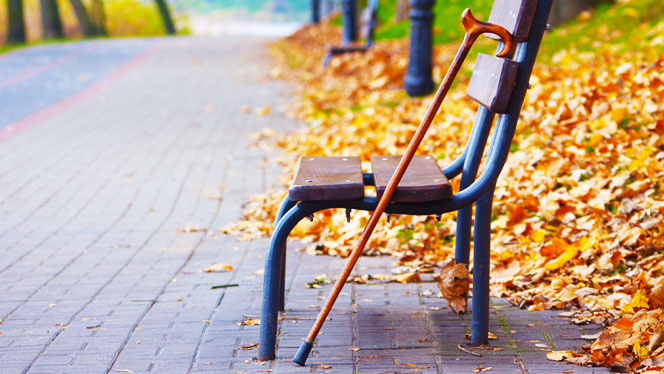What to look for in mobility aids for your parents

Katherine Pyne, creator of online disability shop designed2enable.co.uk, shares her advice for finding the right mobility aids to suit your parent’s needs as well as personal style.
As our parents get older, their mobility may start to become affected. Becoming less mobile can lead to a loss of self-esteem and confidence. They may need support to enable them to stay independent and continue to live in the comfort of their own home.
If your parents are ageing and becoming less steady on their feet, they may need to consider using a walking aid or making basic adaptations to their home. A grab rail by the front door step will help support them as they climb the step, or a rail in the bathroom by the toilet will assist them to stand up, or adding a shower seat to rest on whilst they shower will make washing much less arduous. Simple daily living aids can make a huge difference to safety, preventing falls and broken bones.
A parent who has had a major health complication such as a stroke or a neurological disorder, with severe impairment to their mobility, or the onset of Alzheimer’s, may need the expert advice of an Occupational Therapist (OT).
An OT will assess their needs and give professional advice on necessary adaptations for the home which may include re-designing their bathroom or installing a wet room, adapting their kitchen, providing ramps and walking aids or wheelchairs.
The advice and support from an OT is in many cases available on the NHS by referral from your parent’s doctor or your parent may decide to employ a private OT. Whichever route they choose, an OT will give expert advice on the best way to adapt the home to accommodate your parent’s needs.
The OT will recommend necessary equipment and source solutions for the required adaptations, and will work with the supplier of the products to arrange the supply and any necessary installation of equipment. Grants to finance the adaptations may be available and the OT would be able to give you and your parent advice on this.
There are many decisions to be made and it is worth considering how your parents will feel about using mobility aids and having their house adapted and the impact that this will have on them. Many of the daily living aids that have traditionally been available are clinical to look at and may make your parents feel that they are compromising their lifestyle.
From my own experience, my parents are fiercely independent and would probably struggle on rather than use something that makes them feel frail and old, which is a risk to their safety. I have a very determined aunt who has a heart problem who will be gasping for breath and still will not use a walking aid.
So it may be important when providing your parents with mobility solutions to give them a choice; price and budget is also an important factor to consider, but there are ways to provide sympathetic solutions that are in keeping with your parent’s lifestyle.
To give some examples of pretty vs practical assistive aids, white plastic grab rails and shower seats were one of the products that inspired us to set up our company designed2enable.co.uk. It seems a crime to have a lovely modern bathroom, with stylish sanitary fittings ruined with the installation of a white plastic grab rail. A contemporary chrome rail is far less intrusive and fits seamlessly into a modern bathroom.
The traditional white plastic shower seat sits awkwardly in the shower well but is then in the way for other members of the family. A modern wall hung shower seat flips up when not in use, ensuring it is not in the way of other family members, cannot be tripped over, and is available in a variety of stylish designs.
For general mobility, it is a positive message to have a walking stick that is fun and stylish, that will co-ordinate with any outfit, enabling the user to ‘walk tall’. The modern design of Rollators are sturdy and functional and are developed to consider how compact and lightweight they can be and also how they look. Ugly mobility aids carry a stigma that no-one really wants to associate themselves with but it is possible to find solutions to your parent’s needs that are aesthetically pleasing.
‘Universal Design’ describes the concept of designing products to be aesthetic and usable by everyone, regardless of their age and ability. This term was coined by the Architect who developed the dropped kerb, which as a wheelchair user I have been grateful for on many occasions. Other examples are a grab rail that is designed to be used as a towel rail and soap holder, or kitchen counters to accommodate different postures and tasks, or lever handles on doors rather than twisting knobs which can be hard to grip. Velcro is another universal design product that has transformed our lives regardless of ability.
Hopefully one day universal design will become a natural element within new build houses which would take the pressure off needing to adapt our homes as we age and ensuring the elderly are able to stay independent in their own homes for as long as possible.
Katherine and her husband launched designed2enable in 2013 offering beautifully designed assistive products ranging from stylish daily living to mobility aids. Visit the website or email for more information. Recommended by bluebadgestyle.com.
If you found this article helpful, why not join the family?

